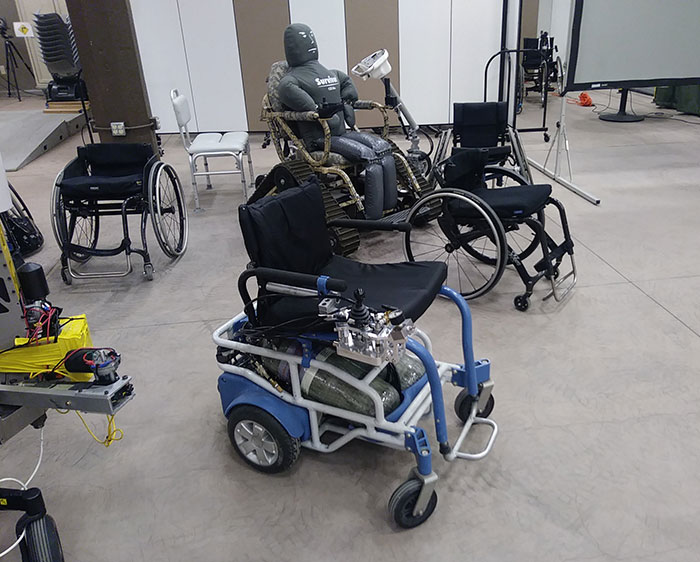People with permanent physical disabilities have used electric-powered wheelchairs for decades. But PneuChair, developed by Human Engineering Research Laboratories (HERL) in Bakery Square, uses compressed air as its primary energy source.
While a battery-powered chair can take hours to charge, PneuChair takes minutes.
“One of the biggest advantages is its waterproof capability, because there’s no fear of shock,” said Brandon Daveler, the lead mechanical design engineer for PneuChair and a University of Pittsburgh doctoral candidate.

The PneuChair, pictured in the biolab at HERL. Photo credit: Sam Bojarski
The New York Times featured this capability in a 2017 video that depicted Morgan’s Inspiration Island, a fully accessible water park located in San Antonio, Texas. Morgan’s Island used some of the first PneuChair prototypes. Daveler now hopes to build a startup company, called Atimize, around the technology.
He plans to run his company full-time when he finishes his doctorate in rehabilitation science at the end of this year. The skills he will need were developed during seven years of research and study at HERL, assisted by the organization’s founder and director, Dr. Rory Cooper.
When Cooper founded HERL with two graduate students in 1994, he sought to create a place where specialists from different disciplines could work together to create life-changing assistive technologies.
Physical and occupational therapy, engineering, statistics and counseling are some of the many disciplines represented at HERL, Cooper said. The facility, supported by the United States Department of Veterans Affairs (VA), UPMC and University of Pittsburgh, features a biolab for testing equipment and an 11,000-square-foot prototyping facility to support design and fabrication of components.
“When I was a grad student, I noticed that all of us were sort of sequestered in individual faculty labs,” Cooper said. “I had this idea, if we got people from different disciplines together … they also might be more creative and solve problems that might otherwise have been intractable.”
Student researchers benefit from the intellectual capital HERL provides and have turned their studies into marketable concepts. Cooper also said he is assisting two other local startups, in addition to Atimize.
These ventures include Navity, a mobile application suite that utilizes insights gained from driving programs, to enhance safety for older drivers. Founder Nahom Beyene conducted doctoral research at HERL.
The second startup, PathVu, aims to enhance sidewalk accessibility by means of a navigation app that reports hazards for users. The startup’s team owes much of their expertise to HERL research experience, according to PathVu’s website.

Daveler (pictured) suffered a spinal cord injury in a motocross accident when he was 15. At HERL, he has worked to enhance the lives of others with permanent disabilities. Photo courtesy of HERL.
Working at HERL allows innovators to go from concept to commercial-quality prototype, to clinical trial if necessary, said Cooper. One current student described the process.
“You go out to the community, garner interviews and focus groups about what people want, what they have and what they like and don’t like. And using this, you can develop a comprehensive roadmap to get a product on the market,” said Mark Greenhalgh, who is pursuing a PhD in rehabilitation science.
This past May, Atimize received licensing for PneuChair and its close relative, the PneuScooter, to commercialize and bring the products to market. Before the end of the year, Daveler said, PneuScooter will undergo pilot testing at Pittsburgh Giant Eagle stores, to see how it operates in a real-world setting.
For Daveler, the Giant Eagle study will help determine whether air power offers a better customer experience, compared to the electric-powered devices the stores currently have. Cooper’s connection to the Giant Eagle ownership and his guidance throughout the process have helped make the study possible, Daveler said.
Its results, he added, will help Atimize penetrate the big box and grocery-store markets. A separate, upcoming four-year study, in conjunction with local VA facilities, could help patients obtain insurance coverage for PneuChair in the future.
But in the near term, Daveler has set his sights on running Atimize once he finishes his degree. He is currently trying to fill two to three positions on his team, including a marketing role.
With his new company, Daveler wants to emulate the work and mission of HERL. Atimize will “continue to develop assistive technologies to help people with disabilities gain equal access and have opportunities to do the things they want to do,” he said.
SAM BOJARSKI – Guest Contributing Writer
Sam Bojarski is a freelance journalist who has reported in communities from Pittsburgh to Port-au-Prince. He covers local news in western PA, spotlighting the people and ideas that define our region. His coverage of the national maritime industry has appeared in multiple trade publications.
Originally published on Monday, September 9th, 2019







